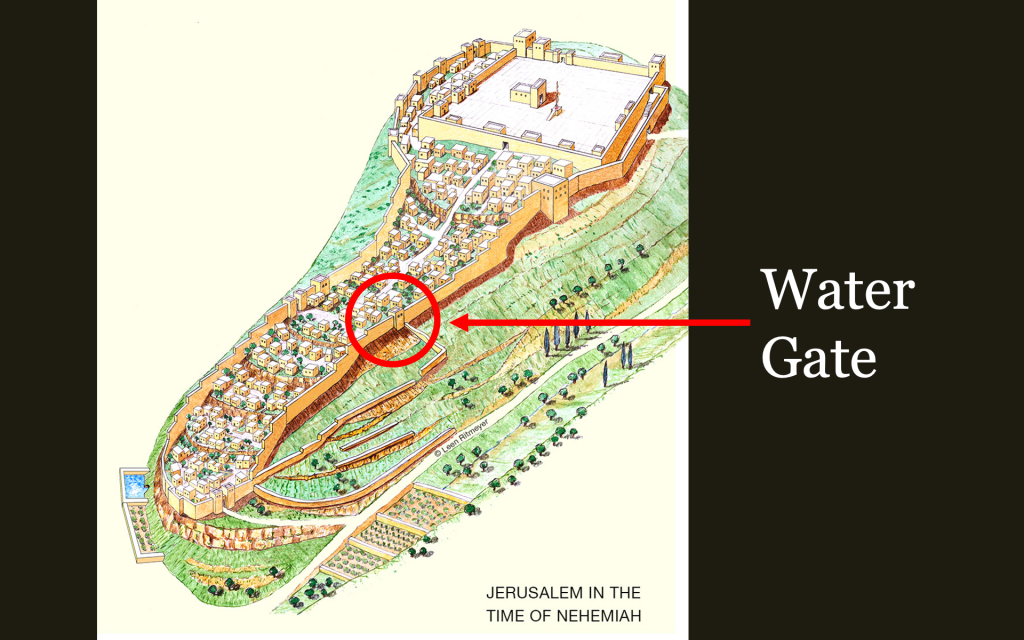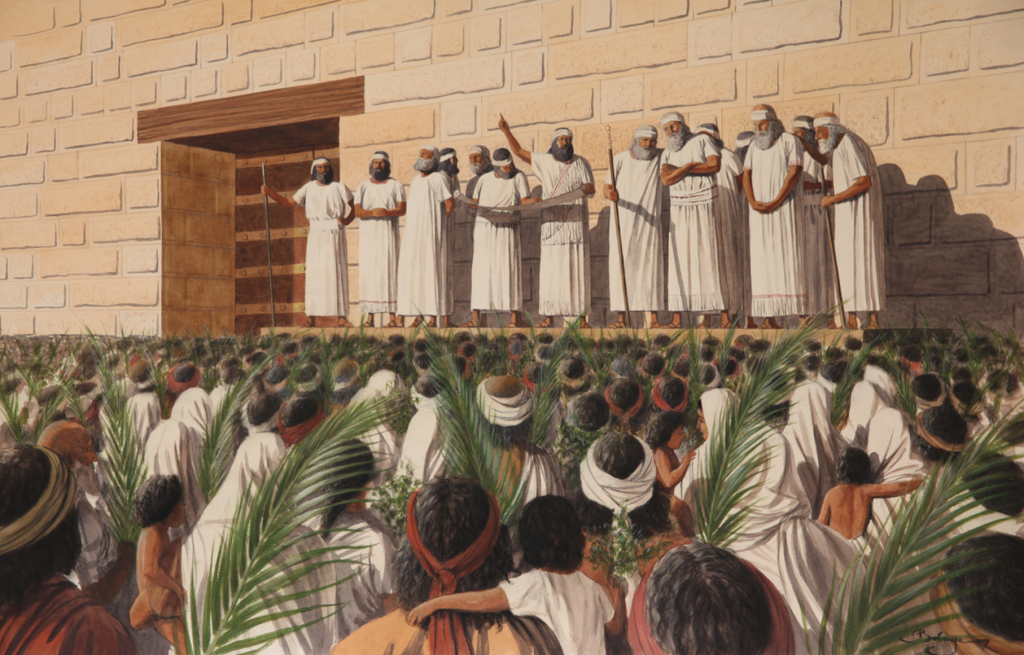The First Reading describes what we would now call, during Mass, the Liturgy of the Word. So, let’s look in detail at this text and then apply it to ourselves, considering topics like arriving on time for Mass, postures during Mass, standing at the back when we don’t need to, and how we treat others at Mass. The main focus today is not our external actions, but God speaking to us. And, because He speaks to us, that moves our hearts and we want to love Him better.
Now, lest anyone feel discouraged, I’ll be the first to say I’ve had a lifelong problem with being late. Many years ago, someone here, who shall remain nameless (Frank Cipriano) called me out for starting Mass late. He actually did me a great favour, because he helped me to express my love for God. Yet, even now I still have a problem with arriving late for Confessions.
How could you improve your participation at Mass? Arrive on time? Stay awake? Pray from the heart? Be cheerful and polite towards others? Not leave early? Not criticizing others in your heart?
The context for the First Reading helps us understand the Jewish people’s emotional reaction at hearing God speak to them. In 587 B.C. the Babylonians conquered Jerusalem and deported most of the Judean people back to their homeland. 70 years later, the new Persian ruler allowed the people to return, and they started rebuilding the city as well as restarting their religious customs. Around the year 440 B.C., after completing the defensive wall of the city, the text says, “When the seventh month came—the people of Israel being settled in their towns—all the people gathered together into the square before the Water Gate. Here’s one possible appearance of the city with the Water Gate, which was close to a natural spring; at the top, you can see the rebuilt temple:
They told the scribe Ezra [a priest and the religious leader] to bring the book of the law of Moses, which the Lord had given to Israel. Accordingly, the priest Ezra brought the law before the assembly, both men and women and all who could hear with understanding” (Neh 7:73-8:2).
Most of us know that, for Catholics, it’s a moral obligation to assist at Mass every Sunday and on Dec. 25 and Jan. 1. However, the phrase, ‘all who could hear with understanding,’ reminds us that obligation only starts applying once children have reached the age of reason, usually around seven years old. Infants and toddlers don’t have to come to Mass because they’re not able to pray at Mass. This is a reminder that, once children receive First Communion, they have an obligation to go to Mass every Sunday. And our parish needs to improve the way we evangelize our children. In September 2025, we’re hoping to start Catechesis of the Good Shepherd on Sundays for children ages three to six.
“He read from it facing the square before the Water Gate from early morning until midday [over six hours presumably]… and the ears of all the people were attentive to the book of the law [Note their spiritual response; they know God Himself is speaking to them]. The scribe Ezra stood on a wooden platform that had been made for the purpose” (8:2-4). This image gives us an idea of how it may have looked:
“And Ezra opened the book in the sight of all the people… and when he opened it, all the people stood up. Then Ezra blessed the Lord… and all the people answered, “Amen, Amen,” lifting up their hands. Then they bowed their heads and worshiped the Lord with their faces to the ground” (8:5-6). Interior love is the most important part of worship, but external signs express that love. When it comes to posture, kneeling expresses worship. Notice the people stand, presumably for hours, because standing is the posture for liturgical prayer. Sitting is for recollection, so that we can understand what the Lord is saying to us. And, starting next week, at certain Masses, Deacon Andrew will process in with this huge book of the Gospels, as a sign of the uniqueness of writings about Jesus.
“So the Levites read from the book, from the law of God, with interpretation. They gave the sense, so that the people understood the reading. [This is the most ancient description in the Old Testament of a liturgical rite in which the priests explain the Law, basically a homily. Many scholars interpret this as a sign that the people now spoke Aramaic, after having lived away from Jerusalem for 70 years; they could no longer understand Hebrew and needed the priests to explain the Law.] Ezra… and the Levites who taught the people said… ‘This day is holy to the Lord your God; do not mourn or weep.’ For all the people wept when they heard the words of the law. [They were cognizant of how they weren’t living up to the Law.] Then he said to them, ‘Go your way… drink sweet wine and send portions of them to those for whom nothing is prepared, for this day is holy to our Lord…” And all the people went their way… to make great rejoicing, because they had understood the words that were declared to them” (8:8-10,12). The result of hearing His word is a changed life: joy and charity! Jesus said that He came to give life and life to the full! And, as we love God, He asks us to love each other.
God loves us and chooses to speak to us. So, here are a few ways we can love Him in return:
Arriving on time for Mass is an act of love towards God. It’s one thing if we have a legitimate excuse, another if we’re chronically late. In our hearts, when we have a real reason, we don’t feel guilty; when we don’t, we know it’s our fault. So, going forward, let’s consider today a fresh start for all of us. The next time we go to Confession, let’s confess if we’ve been late and start over with the Holy Spirit’s grace. Beginning next week and into the future, let’s be a parish family where we show up on time.
As for standing at the back of the church, that is, in the foyer, this might catch us by surprise (and be at peace if you’ve never thought about it), but generally, it’s not a good spiritual idea. The reason is because Mass is a wedding banquet. If we invite someone to our wedding, we don’t want that person to stay at the back when there’s room near the table. Now, it’s understandable if we’re sick, if our babies are crying, or if there’s no more room, but, in those cases, we stand in the back or outside so as not to disturb others. However, if we stay at the back for our own sake, what are we gaining spiritually? Also, it’s not a good example for our children: If they see us purposely hold our family back from the liturgical action in the sanctuary, that will negatively affect their relationship with Jesus. So, this is just a loving invitation to come into the nave whenever possible.
Finally, in terms of loving each other before, during, and after Mass, this is connected with worshipping God. I’ve seen a few times when, during Name Tag Sunday, people dismissively walk by those handing out name tags or refuse to greet others, which is unfortunate. All the saints say that love of God and neighbour are interconnected, and one of the best measures of someone’s worship is their love of neighbour. When we watch videos of St. John Paul II, Pope Benedict XVI, or Pope Francis, they’re not dismissive of people during Mass when there are interruptions; they pray fervently but are aware of others. So, please smile at each other, make room for others in your pew, and greet others by name before and after Mass.
Last year, Pope Francis said, “The word draws us to God and sends us to others… It does not leave us self-absorbed, but expands hearts, changes courses, overturns habits… and discloses unthought-of horizons”.



